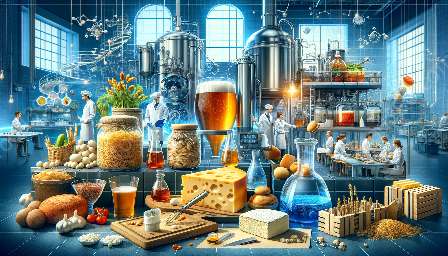Fermented food production is an ancient technique that has gained renewed interest in today's culinary world. The process of fermentation, rooted in fermentation science, plays a crucial role in the creation of a variety of flavorful and nutritious foods and drinks. This comprehensive guide delves into the enticing topic of fermented food production, offering insights into its scientific underpinnings and its implications for the food & drink industry.
The Art and Science of Fermentation
Fermentation is a natural metabolic process that is harnessed to transform raw food ingredients into an array of delectable and health-promoting products. It involves the action of microorganisms, such as bacteria, yeast, and molds, on sugars and other organic compounds, leading to the production of acid, alcohol, and other byproducts. This process not only enhances the flavors, textures, and aromas of foods but also contributes to their preservation and nutritional value.
At its core, fermentation science delves into the intricate biochemical and microbiological mechanisms that drive the fermentation process. This scientific understanding enables food producers to manipulate and optimize fermentation conditions to yield consistent and high-quality products. From controlling temperature and humidity to selecting specific microbial cultures, fermentation science empowers food and beverage makers to craft a diverse range of fermented delicacies.
Diverse Array of Fermented Foods
The world of fermented food production encompasses a rich tapestry of culinary traditions and techniques, giving rise to a stunning diversity of fermented foods and beverages. From staple foods like bread, cheese, and yogurt to globally revered delicacies such as kimchi, sauerkraut, miso, and tempeh, fermented foods are deeply embedded in cultures across the globe.
Each type of fermented food boasts a unique set of microorganisms and fermentation conditions, resulting in a spectrum of flavors, textures, and nutritional profiles. Furthermore, the cultural and historical significance of fermented foods adds an intriguing dimension to their appeal, making them not only a source of sustenance but also a reflection of local customs and traditions.
Implications for the Food & Drink Industry
The resurgence of interest in fermented food production has reverberated within the food & drink industry, prompting chefs, food technologists, and entrepreneurs to explore and innovate with fermentation techniques. Fermented foods are now celebrated for their complex flavors, beneficial microorganisms, and potential health benefits, driving the demand for artisanal and artisan-inspired fermented products.
Moreover, the integration of fermentation science into modern food and beverage production has led to the development of novel, fermentation-derived ingredients and flavor profiles. This fusion of tradition and innovation has spurred the creation of unique fermented concoctions, such as kombucha, sourdough bread, and craft beer, which captivate the palates of discerning consumers worldwide.
Embracing the World of Fermented Food Production
As we peer into the captivating universe of fermented food production, we uncover the symbiotic relationship between the art of fermentation, the scientific principles governing it, and its impact on the food & drink landscape. By appreciating the intricate interplay of tradition, science, and creativity within fermentation, we can better understand the alchemy that transforms humble ingredients into gastronomic treasures.
Whether savoring a tangy bite of pickled vegetables, indulging in a creamy spoonful of fermented dairy, or sipping a sparkling glass of fermented tea, we are not only relishing the fruits of fermentation but also partaking in a time-honored tradition that connects us to our culinary heritage. With its fusion of tradition, science, and innovation, fermented food production continues to captivate and inspire, enriching our gustatory experiences and nourishing our appreciation for the interplay of food, culture, and science.

